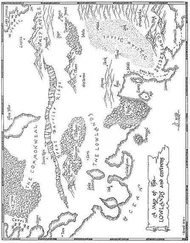‘Get it onto the comms panel.’
‘Are you sure? Only…’
‘Please, Lain.’
Circumventing the comms isolation without opening the ship up to contamination was a surprisingly complex process, but Lain and one of the mutineers set up a second isolated dropbox with the data, and then patched it into the comms system. Holsten imagined the invisible influence of Doctor Kern flooding down the new connection only to find just another dead end.
Doctor Avrana Kern , he readied his next message. I think you should reconsider the need of your experimental world for an observer. When our ship passed your world last, a remote camera captured some images from down there. I think you need to see this.
It was a gamble, a terrible game to play with whatever deranged fragments of Kern still inhabited the satellite, but there was a gun to his head. And besides, he could not deny a certain measure of academic curiosity. How will you react?
He sent the message and the file, guessing that Kern’s recent exposure to the Gilgamesh ’s systems would allow her to decode the data.
Bare minutes later there was an incomprehensible transmission from the satellite, very little more than white noise, and then:
| Please hold for further instructions. Please hold for further instructions. |
What have you done with my monkeys? What have you done with my monkeys? |
And then nothing, a complete cessation of transmission from the satellite, leaving those in the shuttle to fiercely debate what Holsten had done, and what he might have achieved.
Great Nest has no strict hierarchy. By human standards, in fact, spider society would appear something like functional anarchy. Social standing is everything, and it is won by contribution. Those peer groups whose warriors win battles, whose scholars make discoveries, who have the most elegant dancers, eloquent storytellers or skilled crafters, these garner invisible status that brings them admirers, gifts, favours, greater swarms of sycophantic males to serve as their workforce, petitioners seeking to add their talents to the group’s existing pool. Theirs is a fluid society where a capable female can manage a remarkable amount of social mobility. Or, in their own minds, their culture is a complex web of connections re-spun every morning.
One key reason this all works is that the middling unpleasant labour is undertaken by males – who otherwise have no particular right to claim sanctuary within the Nest at all, if they lack a purpose or a patroness. The hard labour – forestry, agriculture and the like – is mostly undertaken by the domesticated ant colonies that the Great Nest spiders have manipulated into working with them. After all, the ants work by nature. They have no inclination or capacity to consider the wider philosophy of life, and so such opportunity would be wasted on them. From the point of view of the ant colonies, they prosper as best they can, given the peculiarly artificial environment they find themselves enmeshed in. Their colonies have no real concept of what is pulling their strings, or how their industry has been hijacked to serve Great Nest. It all works seamlessly.
Portia’s is a society now pulled taut to breaking point. The fact of the encroaching ant column demands sacrifices, and there is no chain of command to determine who must make them and for whose benefit. If the situation becomes much worse, then Great Nest will start fraying apart, fragmenting into smaller fugitive units and leaving only a memory of the high point of spider culture. Alternatively some great leader might arise and take control of all, for the common good – and later, if human examples can be valid guidelines, for the personal good. But, either way, the Great Nest that Portia knows would cease to be.
It would not be the first lost metropolis. In its ceaseless march across the continent, the ant colony has obliterated a hundred separate, distinct and unique cultures that the world will never know again, exterminating individuals and overwriting ways of life. It is no more than any conquering horde has ever done in pursuit of its manifest destiny.
Portia’s military exploits have won some esteem for her peer group, but Bianca is currently their greatest asset: one of the Nest’s most admired and maverick scholars. She has improved the lives of her species in a dozen separate ways, for she has a mind that can see answers to problems others did not even realize were holding them back. She is also a recluse, wanting little more than to get on with her experiments – a common trait for those driven to build on their inherited Understandings – which suits Portia’s peers well, as otherwise Bianca might decide that she was owed rather more of the group’s good fortune.
However, when she sends a messenger, her peers come running. Should Bianca suddenly feel unappreciated, she would have her pick of the peer groups of Great Nest to join.
Bianca is not within Great Nest proper. True science demands a certain seclusion, if only so that its more unexpected results can be safely contained. Portia’s people are, by ancestry, born problem-solvers, and given to varying their approach until something succeeds. When dealing with volatile chemicals, this can have drawbacks.
Bianca’s current laboratory, Portia discovers, is well within the territory of one of the local ants’ nests. Approaching the mound along a trail marked out for the ants to avoid, she feels herself reluctant, pausing often, sometimes lifting her forelegs and displaying her fangs without intending to. The old association between ants and conflict is hard to shake.
The chamber she finds Bianca in would have been dug by the ants themselves, before being cordoned from their nest by the application of colony-specific scents. Such measures have been attempted in the past to ward a settlement from attack by the encroaching super-colony, but never successfully. The ants always find a way, and fire does not care about pheromones.
Silk coats the walls of the chamber, and a complex distillery of webbing hangs from the ceiling, providing the mixing vessels of Bianca’s alchemy. A side-chamber houses a pen of some manner of livestock, perhaps part of the experiment, perhaps simply convenient sustenance. Bianca presides over the whole enterprise from up on the ceiling, her many eyes keeping track of everything, signalling to her underlings with palps and sudden stamping motions when her direction is required. Some light falls in from the entryway above, but Bianca is above the routines of night and day, and has cultured luminescent glands from beetle larvae to glitter amid the weave of her walls like ersatz constellations.
Portia lets herself down into the chamber, aware that part of the floor is also open, giving on to the ant colony below. Through the thinnest skein of silk, she can see the constant, random bustle of those insects going about their business. Yes, they work tirelessly, if unknowingly, for Great Nest’s continued prosperity, but if Portia cut through that membrane and entered their domain, then she would meet the same fate the ants reserve for all intruders, unless she had some chemical countermeasure to preserve her.
She greets Bianca with a flurry of palps to renew their acquaintance; the exchange contains a precisely calculated summary of their relative social standings, referencing their mutual peers, their differing expertise and the esteem that Bianca is held in.
The alchemist’s reply is perfunctory without being discourteous. Asking Portia to wait, she turns her main eyes on the busy laboratory below them, checking that matters in hand can be left without her close attention for a few minutes.
Portia gives the activity below a second glance, and is shocked. Your assistants are male.
Читать дальше












